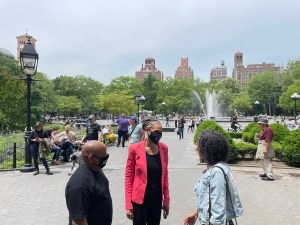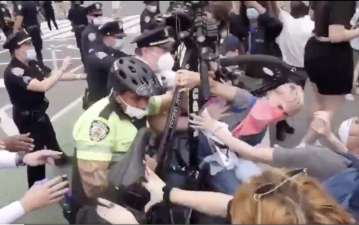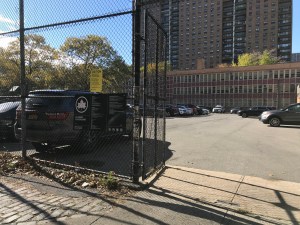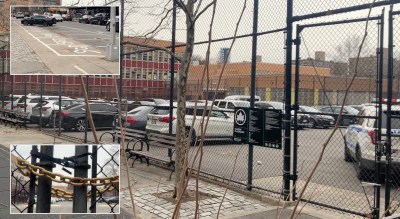NYPD Ask Village Residents When They Want Cops to Close Washington Square Park (Which Doesn’t Belong to Them)
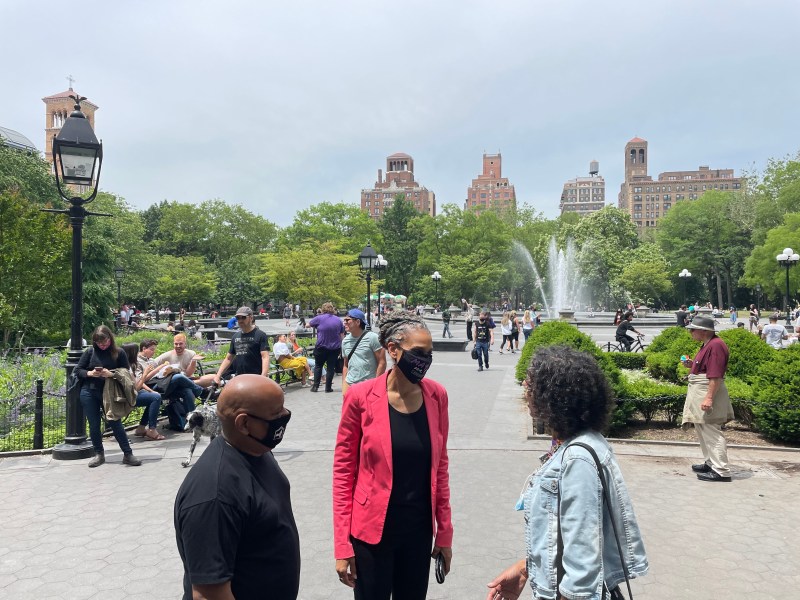
Cops are putting control of what’s become a controversial public green space — Washington Square Park — into the hands of its surrounding wealthy homeowners, whose recent complaints of noise and drugs have summoned scores of riot cops to clear out the public park with a new curfew.
Last month, the NYPD closed the park for the first time at 10 p.m. — two hours earlier than usual — because of complaints of people partying, using drugs, and blasting music on amplified speakers, which are not allowed. But the enforcement led to violent stand-offs between cops and park-goers, and a debate over public safety that has become a focal point in the mayor’s race.
Now, the NYPD is giving property owners around the park the unique power to say who gets to enter the park, when, and for how long.
“We wanted to have a meeting together, and I wanted to get a clear consensus of what we want to do with the park. Do we want the park closed at 10? Do we want the park closed at 12? Do we want music? There’s no sound any time in the park, do we want that enforced at all hours, only certain hours?” asked Assistant Chief Stephen Hughes, Commanding Officer of Manhattan South, during Wednesday night’s “emergency” meeting, which was called by the NYPD’s Sixth Precinct. “So I think that was the importance of getting this meeting together. What’s acceptable in the community? I have some ideas, I would prefer an earlier closing, but I’ll go with what the consensus is. I want to make sure we do what’s right.”
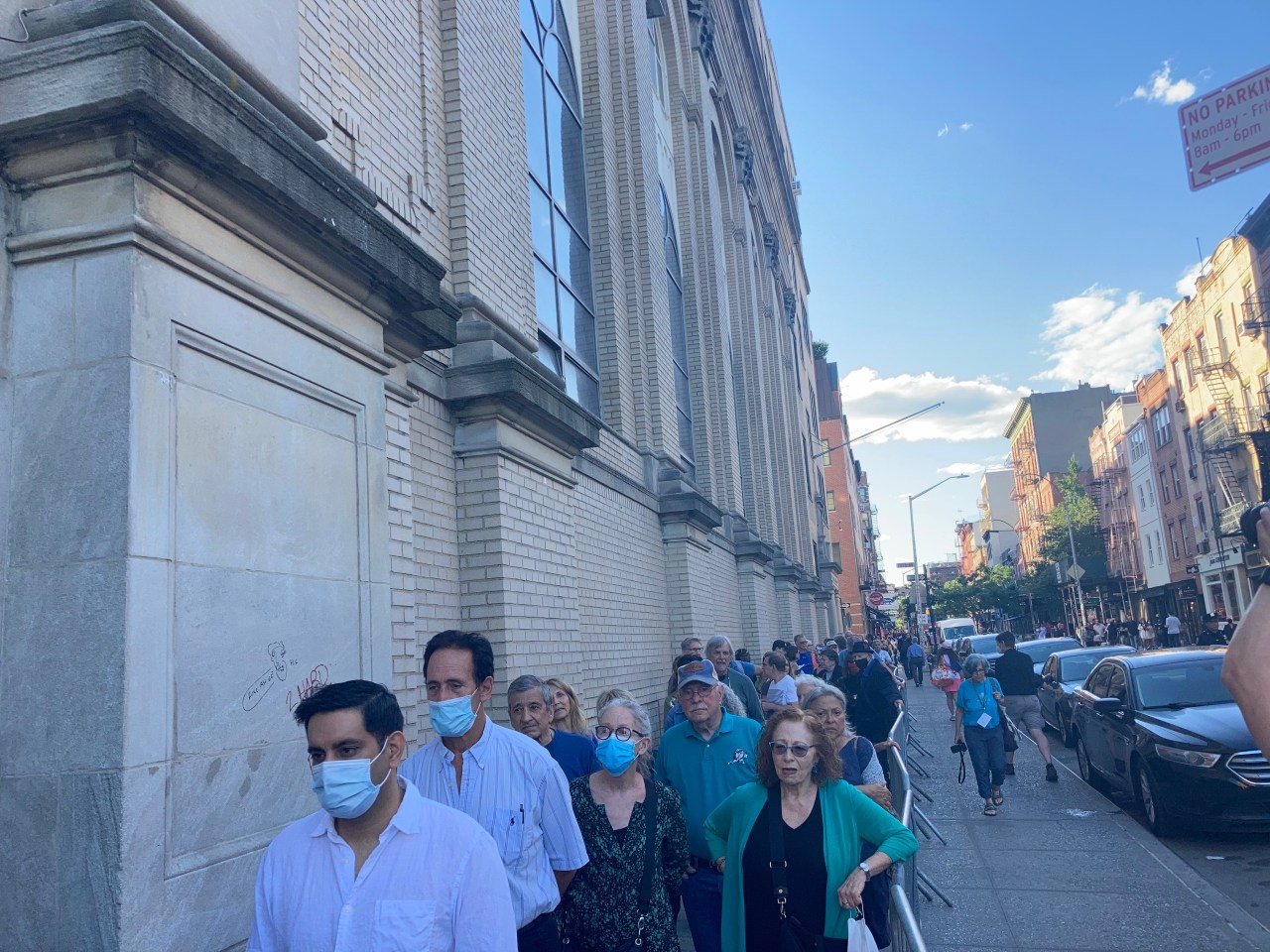
Hughes even asked the crowd for a show of hands of who preferred a 10 p.m. closing vs. a midnight closing — the results of which were not immediately clear, though it appears that 10 p.m. won. And many of the attendees, though they could not agree on a closing-time, similarly used derogatory and coded language when referring to those who frequent the park, throwing around words like “criminals,” and “drug people.”
Chief Stephen Hughes asks for a show of hands for who supports a 10 pm curfew. “You’re outnumbered,” he says to those opposed. pic.twitter.com/lHmehCuvtC
— Jake Offenhartz (@jangelooff) June 16, 2021
The roughly two-hour meeting in the basement of a Greenwich Village church was the culmination of a weeks-long crackdown on revelers in Washington Square Park, after the green-space has become the center of both protest and celebration since last summer. And it attracted typical arguments from older residents who urged New York’s Finest to crack down on people enjoying the public space by playing music, skateboarding, and biking — reminiscent of a similar show of enforcement two years ago when dozens of armed officers swarmed two Manhattan parks to harass kids on bikes and kick them out of the public spaces.
The issues on the table — such as what is the NYPD’s role and whether well-heeled residents should get to determine what happens in a park that belongs to all New Yorkers — have long been a part of New York life, and tend to bring out deeply divided opinions, depending on where one sits: in an expensive condo that overlooks the park or on an overturned milk carton listening to amplified music because that’s what people have done in Washington Square Park since there was amplified music.
“I think we have to look at serious enforcement. We need to do that more aggressively,” one man said. “There are things we can do right now, like skateboards, and bikes, and motorcycles, chain them up and take them away.”
a guy is up talking about skateboarders in #WashingtonSquarePark
"We can get rid of the skateboarders in a day, one day," he said to claps. "All we have to do is have the police confiscate the skateboard it will not be that traumatic for the snowflakes."— Victoria Bekiempis (@vicbekiempis) June 16, 2021
But others pushed back — arguing that merely forcing people out of one small area in the city is not only an abuse of power, but will do nothing to solve any of the underlying problems.
“Kicking them out of the park is not a solution. Same thing as kicking the drug users out of the park — it’s not a solution. It’s not solving the problem. It’s saying, ‘I like my pretty little park to be pretty,’” said Aaron Gamman.

Another attendee said drug use and sound amplification have always been connected to the park — the only difference now is that more police enforcement has made the situation worse.
“Many of the problems in the park have come from police overreaction. Stop the amplification, but the park is our space,” said Mark Milano, who lives a block away from the park. “Public spaces are incredibly important in urban areas because it affects our quality of life. You deal with the elements, you don’t shut the park down early.”
